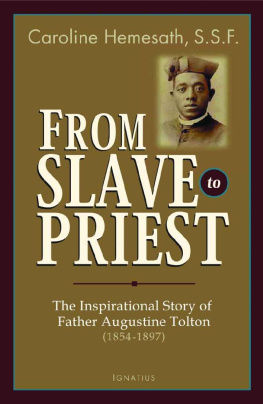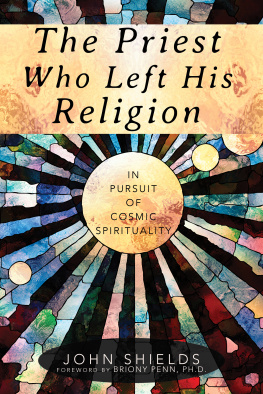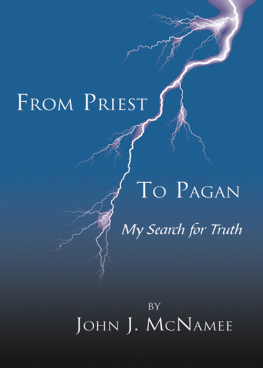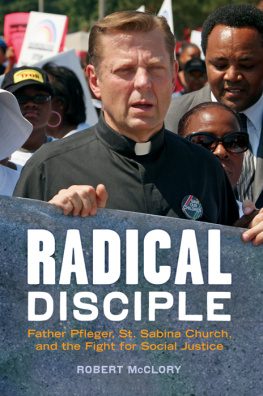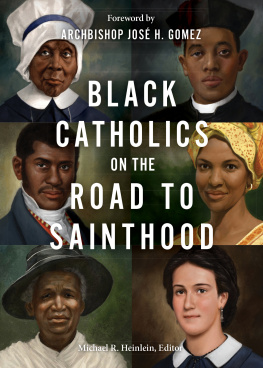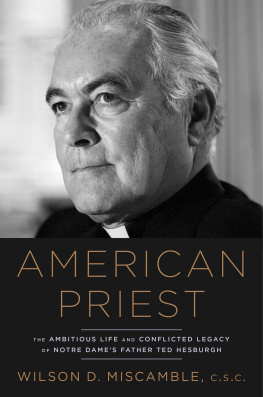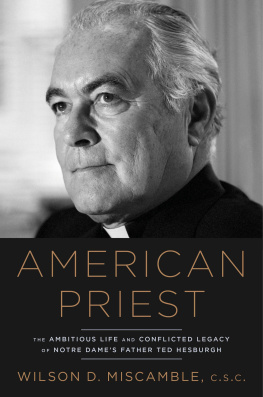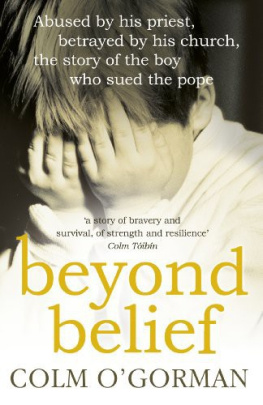FROM SLAVE TO PRIEST

1. Father Augustine Tolton
SISTER CAROLINE HEMESATH
FROM SLAVE
TO PRIEST
A Biography of the
Reverend Augustine Tolton
(18541897)
First Black American
Priest of the United States
With a Foreword by
Deacon Harold Burke-Sivers
IGNATIUS PRESS SAN FRANCISCO
Originally published by
Franciscan Herald Press, Chicago
1973 by Franciscan Herald Press
Reprinted with permission
Published with ecclesiastical approval
Photographs 1, 2, 3, 4, 7, 14, 17, 19, and the cover were provided courtesy of the Tolton Collection at the Brenner Library of Quincy University, Quincy, Illinois.Photographs 5, 6, 8, 9, 10, 11, 12, 13, 15, 16, 18 were reproduced from the 1973 edition.
Cover design by Riz Boncan Marsella
2006 Ignatius Press, San Francisco
All rights reserved
ISBN 978-1-58617-097-4 (PB)
ISBN 1-58617-097-X (UPC)
ISBN 978-1-68149-196-7 (EB)
Library of Congress Control Number 2005938822
Printed in the United States of America
This book is dedicated to
the Most Reverend Joseph M. Mueller, D.D.
retired bishop of Sioux City
the friend of black people
CONTENTS
Foreword to the 2006 Edition
(by Deacon Harold Burke-Sivers)
Foreword to the 1973 Edition
(by Bishop H. R. Perry)
FOREWORD TO THE 2006 EDITION
Sister Caroline Hemesaths powerful narrative of Father Augustine Toltons life is a poignant reminder that with God all things are possible. This welcome new edition reacquaints us with the first black American priest of the United States and chronicles the profound struggle for equality and acceptance faced by black Catholics in the postbellum era. Confronted with a succession of seemingly indomitable challenges (a narrow escape from slavery, his fathers death, abject poverty, exclusion from American seminaries), Father Toltons fervent desire to study Catholicism, his intense longing for the priesthood and his mothers loving support were the well-springs from which he drew the strength to persevere.
Father Tolton knew that unconditional trust in God meant that he must become completely vulnerable before the God who made him. Father Tolton reveled in the folly of divine abandonment, confidently exposing the deepest parts of his soul before God who gave him the strength to exercise his priestly ministry under the weighty yoke of racism. He was a beacon of hope to black Catholics in the nineteenth century who were trying to find a home in the American Church. Father Tolton, in his abiding faith and selfless charity, was the instrument through which Gods love shone brightly. The resplendent chorus, I have come... not to do my own will, but the will of him who sent me (Jn 6:38) echoed majestically throughout Father Toltons brief life.
Despite the oppressive hardships placed upon Father Tolton by a culture firmly rooted in the arid soil of hatred and malevolence, God brought him out of the heart of darkness and used him as an instrument of grace. Father Tolton was a tireless messenger of the Gospel and was not afraid to go into the deep South, where racial hatreds had reached a high pitch and where segregation was decreed by harsh laws. Despite the novelty of being the only black priest in an all-white clergy, the gifted Father Tolton was able effectively to convey the richness, beauty and truth of the Catholic faith, which penetrated even the hardest hearts (Wherever he went, he was respected and honored).
When we look beneath the surface of our national life, we see that the septic undercurrent of racism flows largely unabated. Racism is alive and well, and is intricately woven into the fabric of American culture. But unlike the 1950s and 60s, where racism was overt, extreme, and statutorily institutionalized, the structure of racism today is more subtle and covert, exhibiting itself through outward manifestations of a now unconscious and tacit philosophy of dehumanization.
Since the 1960s and 70s, many black Catholics, in response to racism in the Church, have turned to and been heavily influenced by liberation theology, a Christian belief in the transcendent as a vehicle for social liberation. Liberation theology does not ask what the Church is, but rather what it means to be the Church in the context of liberating the poor and oppressed. As such, the Churchs primary mission is to challenge oppression and identify herself with the poor. For liberation theology, the Magisterium (that is, the teaching authority of the Church) is a member of the oppressive class by definition since, in this view, it does not participate in the class struggle. Ultimately, in this liberation version of Catholicism, faith is subordinate to political ideology, and the Church becomes an instrumental good rather than remaining an intrinsic good and the necessary means of salvation.
Father Tolton, a former slave become Catholic priest, knew well that the basis for any authentic theology of liberation must include the truth about Jesus, the Church and mans dignity. He endured years of frustration, humiliation, and rejection in a country boasting openness to religious freedom and tolerance. Despite the fact that slaves were free, they were far from liberated. In Father Toltons own words: We are only a classa class of dehumanized, brutalized, depersonalized beings. The nation failed the freedom litmus test rooted in its own Declaration of Independence, while the Catholic Church in America failed to live up to the tenets of her own creed and gospel by not recognizing that genuine liberation means freedom from the bondage of iniquity and sin.
With the assistance and support of several very persistent and undaunted priests, Father Tolton was finally accepted by the Catholic Churchin Rome! He thrived in the Eternal City where his priestly vocation was nurtured and where his gifts and talents were recognized, prompting even the prefect of the Sacred Congregation de Propaganda Fide to note what the American Church failed to appreciate: Father Tolton is a good priest, reliable, worthy, and capable. You will discover that he is deeply spiritual and dedicated. For his part, Father Tolton acknowledged the great gift of his Catholic faith and, despite bitter trials and turmoil, remained faithful to the teachings of the Church. He was a visionary who saw far beyond race and politics, looking inwardinto the heart of the Church herself. He taught, The Catholic Church deplores a double slaverythat of the mind and that of the body. She endeavors to free us of both.... She is the Church for our people.
The life of Father Tolton is a study in faithful obedience. When the Vatican assigned Father Tolton to serve as a missionary priest in the United States, where he was a slave, an outcast, a hated black, he obeyed in faith. His was not the faith of blind obedience, like that of an automaton or domesticated animal, but a spirit of faith that, as a child of our Heavenly Fatherin complete humility and generosityhe continually strove to discern and fulfill the will of God under the loving guidance and direction of the Holy Spirit. It is precisely duc et altum into the void, the unknownthat Father Tolton received his mission to be a fisher of men.
The greatest legacy of Father Augustine Tolton lies not in the fact that he was a pioneer, the first black American priest in the United States. Yes, he was thatbut he was so much more! Father Tolton loved and served the Lord with great fervor and intensity. He knew that Gods love is so immense, its power so limitless, its embrace so tender and intimate, that Love Himself brings forth life. Father Tolton was a living testimony to Gods creative, life-giving work.
Father Tolton serves as a role model for those who seek to be configured more perfectly to Christ. Amid great persecution, Father Tolton showed us that being configured to Christ means emptying ourselves so that God can fill us; it means exposing the weakest parts of who we are so that God can make us strong; it means becoming blind to the ways of this world so that Christ can lead us; it means dying to ourselves so that we can rise with Christ.
Next page
